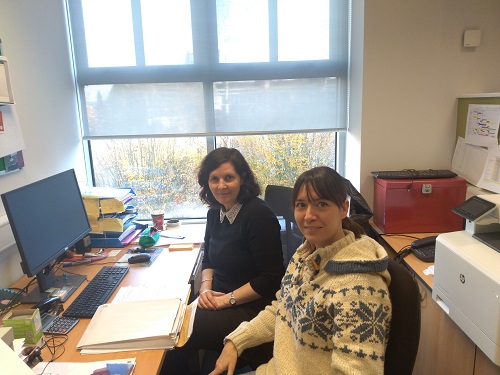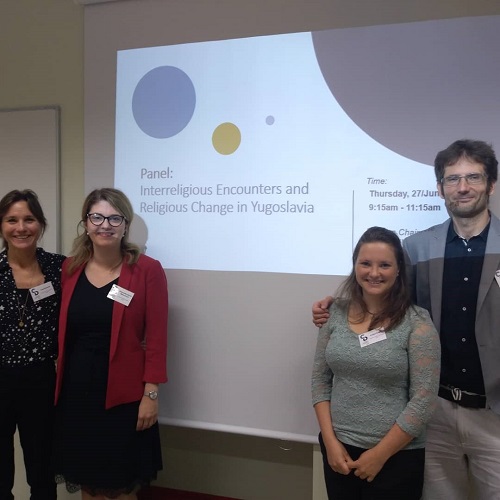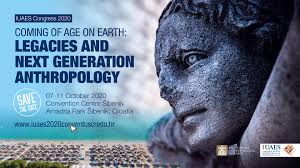
|
ABOUT PROJECT |
|
NEWS |
|
FROM ARCHIVES |
|
CONTACT |
|
|
NEWS
March 31, 2020
On March 23, 2020 we received a notification on the status of the project application "Displaced Archives: Anthropological perspectives on history of marginal religious communities" submitted to the Wenner-Gren Foundation, as part of the UKF project outcomes.
Due to the coronavirus pandemic, the announcement of grantees for this year and the opening of new Wenner-Gren Foundation calls will be postponed.
However, we are glad that our project is evaluated as excellent and that it entered the final phase of deciding on its financing. In hope that all complications will be resolved quickly and positively, we will strive to make the most of gathered data,
Principal investigator and collaborators
Letter from Wenner-Gren Foundation (.PDF document; file size 290 KB; opens in new window)
February 4, 2020
Dr hab Lidia Guzy, Head of Study of Religions Department, University College Cork (UCC) and Dr Lana Peternel, Institute for Social Research in Zagreb, organize a panel entitled Religious Cultures Under the Earth.
The panel is a part of the IUAES2020 Congress Coming of Age on Earth: Legacies and Next Generation Anthropology in Šibenik, Croatia, from 7 to 11 October 2020. This Congress invites scholars from all four fields of anthropology that will be inspired to contextualize their research and ideas with regard to the questions raised by the perspective of Coming of Age on Earth.
All information related to abstract submissions please find on the congress web site: https://iuaes2020.conventuscredo.hr/.
Panel abstract:
Religious Cultures Under the Earth
This panel seeks to explore phenomena of underground religions and cultural and religious expressions related to the Earth in different cultural contexts as well as historical periods. Discussing religion in relation to the Earth from the perspective of hidden, underground spaces enables us to highlight new aspects, which sometimes go hand in hand with the narrative aspects of religiosity, but sometimes give a significantly different picture. Therefore, the panel invites papers dealing with diversified perspectives such as ethno-archaeology, ethnography, folklore and ethno-history and general anthropological considerations aiming to explore the relations between religions and the nature of Earth. The panel welcomes research studies of different practices related to the creation and use of physically hidden spaces including caves or mines all over the world. Under the Earth, we find places and localities given special religious or spiritual meaning. Some of them have a long history and a mythology legitimizing the place as something special, others are rather new and can be understood as part of a reinvention or re-actualization of old traditions. Using the concept of underground religion, we welcome a broad spectrum of research aiming to illuminate the relationship between religion and the nature of Earth from empirical and theoretical approaches. The panel invites the participants to take following questions into account: What makes the place a religious underground?; Is or have the place become a place for struggle between different religious practices?; Has it become part of a political agenda or relation to different concept of religiosity?
January 15, 2020
Announcement 5. FINAL PRESENTATION OF THE UKF PROJECT
The final presentation of the UKF project results will be held on Friday, 31 January 2020 at the Institute for Social Research in Zagreb. The outcomes of the project will be presented by Lana Peternel, Project Leader.
Announcement 4. FUTURE PLANS

FIGURE 4. Photograph from selected archive; the Croatian State Archives selected by the project collaborator Dr. Filip Škiljan
In the end of the project, the plans for future scientific career consist of short and long-term goals. The short-term goals include new project applications (Marie S. Curie Individual Fellowship, ERC, HERA etc.), and the publications of original scientific papers and the book. The long-term plans are related to the establishment of new collaboration groups with scholars working on different issues in social sciences and humanities and mutual development of competitive project proposals.
Announcement 3. MUTUAL COLLABORATIONS

FIGURE 3. Photograph from selected archive; the Croatian State Archives selected by the project collaborator Dr. Filip Škiljan
During the research and working on the UKF project, Lana Peternel learned fundamental steps in the analytical methodology of archival ethnography using Omeka software (https://omeka.org/).
Dr. James Kapalo presented the web platform Omeka that allows users to analyze and exhibit cultural heritage objects, and extend its functionality with themes and plugins (https://omeka.org/). The collaboration with Dr. Kapalo provided specific knowledge, motivation and inspiration for the development of the novel research concept how to create new approaches focused on religious communities.
Prof. Ankica Marinović, Ph.D., project collaborator, was also included in the discussion about document description and interpretation.
Prof. Jana Žiljak Gršić, Ph.D., expert in digital design, created the frame of digital database that will serve as a platform for future analysis and interpretations.
Announcement 2. NEW CODING SYSTEM ACCORDING TO ERC “HIDDEN GALLERIES” PROJECT (http://hiddengalleries.eu/)

FIGURE 2. Slide from UKF project presentation at University College Cork, Ireland, on 14th November 2019.
Lana Peternel set up different levels of categories for document selection in different files and folders for further analysis. The criteria for document selection and the analysis were developed with the UKF project co-leader Dr. James Kapalo, in accordance with ERC “Hidden galleries” project (http://hiddengalleries.eu/) coding system and practices. According to proposed methodology, Lana Peternel defined the final list of codes applied on the sets of selected documents. By the analysis of codes, crucial knowledge for the interpretation of archival documents was acquired. The categories were defined as letters, correspondence material, religious art, newspaper articles, police documents/files and records, photographs, drawings, and diaries. The code and description analysis resulted in extended assumption of the meaning of archives for different religious groups. All researchers examined documents according to the time of establishment, type of documents and preservation status. However, researchers adopted the extended description of the documents, along with the source of their genesis. The final list of codes is: Item, Title, Description, Subject, Creator, Source, Publisher, Date, Rights, Format, Language, Type, Identifier, Coverage, Bibliographic Citation, Data, Religious group, Time, Type, Content/Topic of document, Preservation status, and Religious activity.
Announcement 1. FINAL SELECTION OF ARCHIVAL DOCUMENTS

FIGURE 1. Photograph from selected archive; the Croatian State Archives selected by the project collaborator Dr. Filip Škiljan
During the UKF project, Dr. Lana Peternel and two project collaborators, a historian Dr. Filip Škiljan and a sociologist of religion Dr. Ankica Marinović conducted the final selection of 84 documents for description and analysis. After the selection of documents, and during the research visit at University College Cork, Lana Peternel conducted detailed historical archival documents description according to the content and document genesis. During two and a half months all project collaborators contributed to the interpretations of the findings with contextualization of the history of minority religions groups.
January 14, 2020
Based on new insights and experience during the study visit to Cork University, a group of UKF project scientists and researchers has submitted a new project to the Wenner Gren Foundation. The project proposal is entitled 'Displaced Archives: Anthropological Perspectives on the History of Marginal Religious Communities'. The already established group was augmented by Dr. Hrvoje Čargonja, associate professor from the Faculty of Humanities and Social Sciences, University of Zagreb.

January 14, 2020
Lana Peternel, UKF project leader and Ankica Marinović, project collaborator will participate at ISORECEA conference (International Study of Religion in Eastern and Central Europe Association) entitled 'Religion on the Periphery' in Olomouc, Czech Republic, in April 2020.
The authors will present the first analysis, results and insights on archival material. The oral presentation entitled 'Displaced Archives - Forgotten Stories: Different Perspectives on History of Marginal Religious Communities in Croatia' includes new anthropological perspectives on the religious archive of the Islamic community in Sisak.
Abstract:
This paper is based on a comparative, multilevel ethnographic study that discusses the concept of religious identity by exploring historical archives of a marginal religious community.
Using sociological and anthropological theoretical account, we claim that historical archives evoke and reinforce individual and collective memories and emotions that are crucial in the development of religious identities.
Therefore, we presume that subjective and objective strategies of preserving material evidences of religiosity in archives allow deeper understanding of marginal religious community agencies.
In the context of the multi-religious Croatian society, and at the intersection of the analysis of archival material evidence and people's memories, this paper presents new insights on the construction of minority religious identity in Croatia. As the case study, we are focused on a small Islamic community in the city of Sisak. We will present archival material evidences along with the ethnographic data discussing how this religious community experiences and creates identity using different concepts of remembering.

November 26, 2019
From 19th till 23rd November 2019, within the UKF project “Anthropological research of minority religions in historical archives in Croatia“, Dr. Lana Peternel participated in the setting up and opening of the exhibition “Hidden Galleries: Clandestine Religion in the Secret Police Archives“ in Cluj, Romania.
The exhibition was conceived as the final dissemination phase of the ERC project “Creative Agency and Religious Minorities: 'Hidden Galleries' in the Secret Police Archives in Central and Eastern Europe“, conducted by the research team led by Dr. James Kapaló from University College Cork.
Till the end of December 2019 the cultural heritage of minority religious communities, which was confiscated during the repression and totalitarism in Romania, is exhibited.
Therefore, the Museum of Art in Cluj is hosting the visual and audio materials, and the documents that testify on the secret practices of minority religious communities, and the secret surveillance and oppression of these communities by the state security authorities, the so-called Securitate. The minority religious communities in Romania were subject to systematical, intensive surveillance and discrimination and during the times of repression they developed various modes of concealing their cultural activity, which was systematically documented in the secret police archives and documents.
Photo-gallery and details about the exhibition and the project can be found at:
https://www.facebook.com/hiddengalleriesERC/
http://hiddengalleries.eu/about/
November 13, 2019
The UKF project coordinator Tana Morić shared experiences with the Irish colleague Siobhan O' Brien, the coordinator of the ERC project "Creative Agency and Religious Minorities: Hidden Galleries in the Secret Police Archives in Central and Eastern Europe".
At the University College Cork Study of Religions Department Siobhan introduced Tana with many tips & tricks of the project administrative coordination, in the period from 8th to 13th November 2019.

September 23, 2019
Lana Peternel began her study visit at Cork University on September 23, 2019. The announcement was posted on the following link of the ERC project Creative Agency and Religious Minorities: "Hidden Galleries" in the Secret Police Archives in Central and Eastern Europe:
http://hiddengalleries.eu/uncategorized/__trashed/
July 10, 2019
Lana Peternel, Ph.D. from the Institute for Social Research in Zagreb participated at the 17th Annual Conference of the European Association for the Study of Religion - EASR titled Religion - Continuations and Disruptions held in Tartu, Estonia, from 25th till 29th June 2019. She presented a paper Historical and Anthropological Perspectives on Minority Religious Communities during Socialist Time in Croatia written in co-authorship with Filip Škiljan, Ph.D. from the Institute for Migration and Ethnic Studies. The conference was held at the University of Tartu Institute of Cultural Research and was organized by the Estonian Society for the Study of Religions. It gathered more than 600 participants from 60 countries.
Summary:
Historical and Anthropological Perspectives on Minority Religious Communities during Socialist Time in Croatia
Filip Škiljan, Lana Peternel
Long-lasting efforts of minority religious communities in Croatia during socialist and post-socialist time for legal recognition, visibility and nominal acceptability shed a light on cultural, national/ethnic and religious identities construction in Croatian society today. Collected historical documents gathered from “liminal” religious community archive relate to diverse communication practices between their representatives and governmental institutions. Documents include private letters, more hidden and intimate ethnographic narratives, along with official administrative reports or notes indicating diverse structural patterns of social hierarchy. Aiming to give subjective perspective of interlocutors on the processes occurred on seemingly peripheral field of political interest; we introduced ethnographic approach and conducted in-depth interviews with representatives involved in diverse religious minority community establishment. We hypothesized that enduring struggle for minority religious rights and cultural recognition and lack of transparent institutional support influenced ambiguous sociocultural outcomes, and mirror changeable and dynamic political and sociocultural context. Moreover, we show that development of complex and non-transparent communication patterns between institutions and individuals or groups creates widespread perception of permanent segregation encouraging one-dimensional national and religious identification practice. Representing those events from diverse perspectives, we describe and reexamine formal relationships toward religious minority groups in former Yugoslavia likewise in current Croatia.

June 17, 2019
On Friday, 14th June, 2019 in the Mimara Museum the Institute’s UKF project “Anthropological research of minority religions in historical archives in Croatia. Neglected archives“ was presented. Project leader Lana Peternel, Ph.D. presented to the audience this interdisciplinary project in which historical archives of minority religious communities in Croatia will be explored. For the first time the most cutting-edge technological equipment will be used for this purpose, i.e. the Projectina Docucenter 4500 device which applies INFRARED technology for digitalization of archive materials, but also other types of documents. The access to the device was provided by the partner institution University of Applied Sciences in Zagreb, i.e. the project collaborator prof. Jana Žiljak Gršić, Ph.D. During the project presentation, the Institute’s director Dinka Marinović Jerolimov, Ph.D. pointed out that this project was in line with the Institute’s mission and vision. Prof. Ankica Marinović, Ph.D. emphasised the importance of presenting this topic to the broader public and thus contributing to the minority religious communities’ visibility and reducing prejudices and discrimination towards them, with the overall aim of promoting religious tolerance. Project collaborator Filip Škiljan, Ph.D. (Institute for Migration and Ethnic Studies) presented the field research previously carried out in minority religious communities’ archives in Croatia and provided a glance into the obstacles he was facing during the process and the often poor conditions in which the archive materials were found.
The project is financed by the Unity Through Knowledge Fund – UKF, and the research approach is developed through collaboration with the Principal Investigator of the ERC project “Hidden Galleries“, James Kapalo, Ph.D. from the Study of Religions Department, University College Cork. Dr. Kapalo is a specialist in the field of ethno-religious minorities and minority religions in Central and Eastern Europe. He has substantial professional experience in both archival and ethnographic research and will be able to provide his expertise that will be invaluable for the development of the field of anthropology of religion, which is less developed in Croatia, despite its relevance for contemporary society.
Invitation (.PDF document; file size 95 KB; opens in new window)

